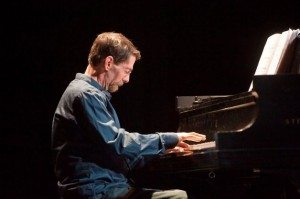
 Solo piano can be a risky endeavor. When a pianist is alone onstage it's just them, the piano, and their wits against the crowd. In the hands of an amateur, a solo piano performance can get drab, even boring. In the hands of a master like Fred Hersch, however, the performance will take you on a voyage across the possibilities of sound and reveal that the harmonic world is limitless. The Ferdinand Magellan of music, he explores the fringes of the soundscape as he plays, uncovering incredible sounds along the way. The earth, though, is finite; music has no conceivable end.
Solo piano can be a risky endeavor. When a pianist is alone onstage it's just them, the piano, and their wits against the crowd. In the hands of an amateur, a solo piano performance can get drab, even boring. In the hands of a master like Fred Hersch, however, the performance will take you on a voyage across the possibilities of sound and reveal that the harmonic world is limitless. The Ferdinand Magellan of music, he explores the fringes of the soundscape as he plays, uncovering incredible sounds along the way. The earth, though, is finite; music has no conceivable end.
Hersch's harmonic sense is so advanced that it takes a while to identify what tune he's playing even if it's a jazz standard. Case in point: his performance of "Caravan", the quintessential number originally performed by Duke Ellington. In theory, it's a fairly straightforward piece -- a minor key and a phrygian melody. Yet as Hersch demonstrated, chords can be substituted, or even changed completely to one of an entirely different quality, while the head melody and feel of the song is retained. His "Caravan" was in equal parts hypnotizing and beautiful. His touch and use of dynamics draw you in and make you accept the fact that he's essentially rewriting a classic.
Later on, in between songs, Hersch said, "I'd like to play this one for you, it's by Lennon-McCartney." Seeing as how I have an eidetic memory of all things Beatles, I was excited to try and identify the song he was about to begin playing. Because the opening chords were so rich and complex, it took a while, but I eventually heard the melody of the original tune. I could almost hear Paul McCartney singing the words: "Your day breaks, Your mind aches / You find that all the words of kindness linger on / When she no longer needs you." Indeed, the song was "For No One" from the Revolver album. I was stunned: a song that I've heard hundreds upon hundreds of times, and one of my favorites, was retooled before my very eyes. Yet, when Hersch reached the part that corresponds to the B-section of the Beatles original ("And in her eyes you see nothing") all bets were off. The song, augmented, took on a new life.
After the set ended I couldn't help but feel that this is how music is meant to evolve. Much like the way bebop artists took preexisting chord progressions and composed new melodies for them, Fred Hersch takes preexisting melodies and invents new chords for them. He stages conflict, loss, happiness and victory with his hands on the keys of a piano. This emotional, inimitable approach to the instrument makes him worthy of all the praise he's already received. What a talent.